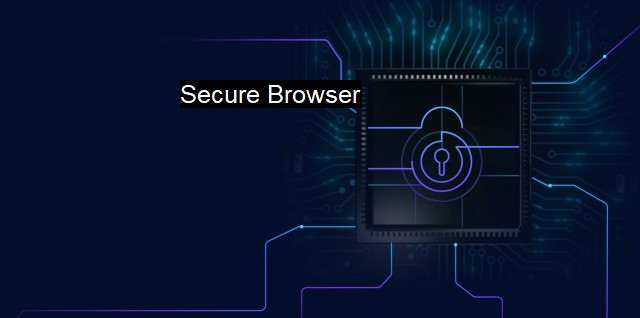What is Secure Browser?
Exploring Secure Browsers: The Essential Component of Cybersecurity and Antivirus Software for Protecting Personal Data and Digital Security
A secure browser is an internet browser armed with unique features to keep an individual’s online activities and transactions safe from third-party interceptions and intrusions such as cyber-attacks and data misuse. this forms a crucial factor, as we increasingly perform sensitive transactions online, such as online banking, shopping, educational matters, and professional tasks. A secure browser is designed to protect users' privacy and increase the benefits of the Internet without needing to delve into the complexities of internet security.When a person uses the internet, they leave a digital footprint, presenting an opportunity for cybercriminals to exploit these digital traces to gain illicit access to personal and financial information. This leads to different forms of cybercrimes like identity theft, ransomware attacks, or phishing which result in increasing demand for secure browsers as an intrinsic tool for robust cybersecurity measures.
Secure browsers employ several methods to protect users' identities and data as they navigate the internet. One notable feature is encryption, a vital cog in the privacy wheel, where data transmitted between the user's browser and the visited website is transformed into a code. This coded data can only be decrypted with a specific key, hence protecting the information from interception and misuse. The commonly used encryption protocol among secure browsers is HTTPS (HyperText Transfer Protocol Secure), where web connections are encrypted. To identify HTTPS sites, a small padlock icon can be seen on the left side of the browser's address bar.
a secure browser limits third-party tracking, including cookies. Cookies capture personal user information to enhance the online experience, which marketers often exploit for targeted advertising. secure browsers offer anti-tracking functionality that limits or entirely blocks tracking cookies, providing users with an anonymous web browsing experience.
Secure browsers may use virtual networks or tunnels to further encrypt data and mask the user’s location. A Virtual Private Network (VPN) cloaks the user's IP address, so online actions cannot be traced back to the user, hence maintaining the user's privacy. Besides, this tool allows access to geo-blocked content without compromising security.
Secure browsers are associated with safe browsing tools, including antivirus protections. This feature scans websites and downloads for malicious software before providing user access. A file found suspicious will be first isolated and then examined separately, therefore preventing the spread of malware that exploits system vulnerabilities.
Secure browsers effectively combat pop-up phishing attempts which are prevalent in regular browsers. They provide protection against unsafe websites by warning users before they click on a malicious or phishing site. They extend their security parameters to providing Secure DNS (Domain Name System), preventing users from accidentally entering a phishing site.
Fundamentally, secure browsers offer an antidote to invasive internet activities, providing peace of mind for users. Secure browsers are a crucial part of maintaining one's online privacy and security, given the constant advancements in cyber threats.
Merely using a secure browser is not a panacea. Users bear a responsibility to empower themselves with knowledge about phishing techniques and other cyber threats, ensure regular software updates, strengthen their passwords using a password manager, and avoid sharing sensitive information online. Coupled with other cybersecurity measures, such as reliable antivirus software, secure browsers can help create a robust shield against cyber threats.
Secure browsers should be part of a broader cybersecurity strategy involving awareness of potential cyber threats, specific software and systems to combat those threats, and a continuous improvement approach to upgrade against ever-changing and improving cyber threats. In our ever-growing digital world, the concept of a secure browser, therefore, becomes integral to navigating the vast universe of the internet safely.

Secure Browser FAQs
What is a secure browser?
A secure browser is a web browser that has advanced security features built-in to protect users from malicious cyber-attacks. This type of browser usually includes features such as anti-phishing protection, anti-malware protection, and encryption to keep your data secure.What are some features to look for in a secure browser?
When looking for a secure browser, it's important to look for features such as anti-phishing protection, anti-malware protection, encryption, and privacy features such as ad-blockers and private browsing mode. Additionally, some secure browsers may also include features such as password managers, automatic updates, and sandboxing to prevent malicious code from accessing your system.Are all secure browsers the same?
No, not all secure browsers are the same. Some secure browsers may be more focused on privacy, while others may be more focused on security features such as anti-virus and anti-malware protection. It's important to evaluate your own needs and preferences when choosing a secure browser that's right for you.Do I still need an antivirus if I am using a secure browser?
While a secure browser can add an additional layer of protection against online threats, it's still recommended to use an antivirus software to protect your device from malware and other malicious attacks. Antivirus software can protect your device from a wider range of threats, including those that may not be targeted specifically at your browser.| | A | | | B | | | C | | | D | | | E | | | F | | | G | | | H | | | I | | | J | | | K | | | L | | | M | |
| | N | | | O | | | P | | | Q | | | R | | | S | | | T | | | U | | | V | | | W | | | X | | | Y | | | Z | |
| | 1 | | | 2 | | | 3 | | | 4 | | | 7 | | | 8 | | |||||||